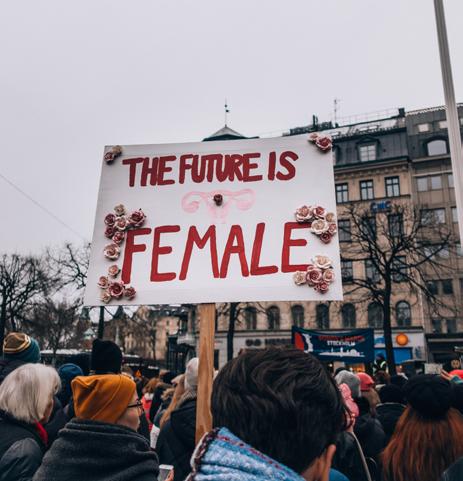
4 minute read
Mr. Vice-president, i’m speaking” - on speaking and being listened to in a gender imbalanced world
In a family dinner, party, class debate, or work meeting. In political debates or judicial sessions. In any of these situations, you may have realized that gentlemen take the floor more naturally, more often, and for longer than ladies. Or you have seen a man interrupting a woman. Possibly repeatedly, to contradict, complement or simply anticipate what she was saying. Or maybe you have seen him explaining to her a topic of her own expertise. Or perhaps you have seen a man rephrase a woman’s arguments in his own words or to utter confirming expressions after she speaks.
If you have seen or lived any of this, you are not alone. The worldwide resonance of Kamala
Advertisement
Harris’ “I’m speaking” to Mike Pence’s continued interruptions in the US vice-presidential debate reminded us how common these phenomena are and how we all relate to them, one way or another. But why is there such a gender-based asymmetry when it comes to the simple human acts of speaking and listening? How can we fight it, rebalancing turns, legitimacy, and tradition of speech?
The stubbornly present and scientifically proven imbalances mentioned above 11come down to 1) the different ways in which boys and girls are socialized - or have been until now - and 2) the consequent distinct roles we have socially built for adult men and women in the Western world.
Men have traditionally been the center of attention. And the decision power. In the family circle, at the workplace, in socio-political structures. They were the breadwinners, studied the most, and had the top positions in companies and social hierarchies. Consequently, they got to have their say. What they said mattered, symbolically and concretely, to determine what all thought and did, the running of the house, the firm, the government, the country. They have not been used to having their arguments challenged or speech hegemony disputed.
Meanwhile, women have traditionally played the supporting roles, acting behind the scenes and silently. They were expected to accommodate family disputes, to make sure everybody around them had all they needed to eat, drink, work. They studied what they needed to fulfill their assisting positions - as mothers, wives, secretaries, employees. Their act of speaking was often related to transmitting or executing messages emitted by men, their authority deriving from their relation to them. Expressing their own views or men’s was rather the (impertinent and unwelcome) exception than the rule. They have not been accustomed to speaking or to be listened to, in their own right.
All this is changing and we all must fight against these speech injustices for this to keep changing. First, for people to realize that a gender gap exists in how and how much we are expected and entitled to speak and listen, and that this is intolerable. Second for us to behave differently and get used to others doing the same. For men to hear women, until the end, without feeling the need 111to validate in any

way what they said, without teaching, patronizing, or condescending towards them. For women to be confident to speak their minds, take the floor, be assertive concerning any, subtle or brutal, attack on their right to voice their thoughts without interruptions, further validations, condescendence, or preaching.

But let’s remember that the historical path to gender equality is yet a very recent one. It has not been 100 years since women in the West have gone massively to work, 50 years since they have in great numbers entered university, maybe not 30 years since we started they started getting top positions and people thinking they should rightfully be there, and not in a minority. This is not enough time for (all) people to let go of conceptions and behaviors. For the intergenerational transmission of values and practices to be entirely changed. So, each time a speech injustice happens, undermining a woman or girl’s right or legitimacy to speak, exempting a man or boy from his human obligation to respect and hear, it is very important to step in. First, signaling what is happening, then resuming the conversation, making it a dialogue, fair, respectful, and equal.
All with firmness but without accusation. It is not in adopting belligerent rhetoric but a conciliating, clarifying, and justice abiding one that we get people with whom we disagree on equality matters to understand our viewpoint. It is not in canceling a whole person, or mindset, but in targeting constructive critique to one issue (at a time) that we get them to listen.
This being a structural, historical issue shaping people’s mentality and social relations, it is not in blaming or shaming any individual that we will solve it. It might actually be counterproductive. People tend to be more attached to their views when they feel attacked. Not to mention the fact that, until someone opens their eyes, many people just act unconsciously, repeating patterns of behavior they have observed and learned from their elders or society around.
Rather, it is in empowering each woman and girl to be confident and assertive, and in raising awareness and generating equality driven behavior in each man and boy that we will make a change. This has the potential to spread and impact, as the widespread reactions to Kamala Harris’ attitude in the US vice presidential debate have shown us.
It is not always easy but is the right thing to do - a moral duty for us all. And triggering, boosting, and pushing for this long term gradual change is the smart path forward also, should we wish our interactions - at home, at work, socially, online - to be more just and downright pleasant. To watch and to personally take part in.










